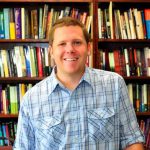“A right understanding of the work of Christ is dependent on a right understanding of the person of Christ.” — Dr. Ken Keathley
Pastors, staff, ministry leaders, and church members gathered at Movement Church in Richmond on Wednesday, September 13 for a day of equipping and training through Seminary for a Day, a partnership event between SBC of Virginia and Southeastern Baptist Theological Seminary. Dr. Ken Keathley delivered a lecture at the event.
“A deviant Christology has terrible ramifications,” warned Dr. Keathley as he took participants on an overview of church history and Christological controversies. The survey included a description of the heresies, examples of how those heresies are still held today, and tips on how orthodox Christians can respond to such heresies. Additionally, Dr. Keathley highlighted many church councils and creeds from church history which have helped faithfully articulate a biblical Christology. The Baptist Faith and Message 2000 includes this article on God the Son,
Christ is the eternal Son of God. In His incarnation as Jesus Christ He was conceived of the Holy Spirit and born of the virgin Mary. Jesus perfectly revealed and did the will of God, taking upon Himself human nature with its demands and necessities and identifying Himself completely with mankind yet without sin. He honored the divine law by His personal obedience, and in His substitutionary death on the cross He made provision for the redemption of men from sin. He was raised from the dead with a glorified body and appeared to His disciples as the person who was with them before His crucifixion. He ascended into heaven and is now exalted at the right hand of God where He is the One Mediator, fully God, fully man, in whose Person is effected the reconciliation between God and man. He will return in power and glory to judge the world and to consummate His redemptive mission. He now dwells in all believers as the living and ever present Lord.
Dr. Keathley then gave a biblical survey of the theological significance of the virgin birth, the sinless life, and the resurrection of Jesus, and he connected the dots between who Jesus is and what he has done. Orthodoxy demands we understand both the person and work of God the Son. We must not be flippant as we answer that question which Jesus posed to Peter, “Who do you say that I am?” (Matt 16:15).
Students of Seminary for a Day worked to keep up as their pens jotted notes and reflections. They furrowed their brows as they thought deeply about theological concepts such as the hypostatic union of Christ or the various theories surrounding the atonement. And during this academic exercise moments struck when students put down their pens and praised God. As their minds were stretched, their hearts soared.
We do not honor Christ with shallow thinking. As Peter calls us to “proclaim the excellencies” of Christ (1 Peter 2:9) so he implies that we ponder those excellencies. Paul modeled careful and worshipful thinking about Christ as he warned of Christological errors in his letters. Yes, Christian, Jesus commands you, “Love the Lord Your God with all your […] mind” (Luke 10:27).




No comments have been added.